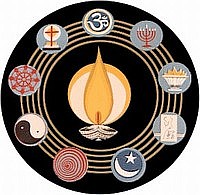
Fearlessness
The letting go process, which all meditators engage in, is fortified when we overcome fear. Many people are constantly fearful. Fears constitute projections of, for example, being hurt, being judged by others, being disliked, being unloved, fear of losing things or close ones, fear of potential failure, being broke, becoming ill and, most of all, fear of death. The list of fears is a long one.
But what is fear? Fear is an energy entanglement that opposes love. Fear stops the natural flow of life-supporting energy, both subtle and physical, and it’s one of the most negative energies we can invoke.
Almost every fear stems from the fear of death. The ego dominates with the idea that the little self is the centre of all and should be preserved ad infinitum. The ego has to do this because it is not real and is aware of its own upcoming extinction at the point of bodily demise - and so tries to convince the intellect that the same applies to the wholeness of the personality.
Fear can be resolved to a large extent if the correct mental attitude towards death and life can be maintained.
With a strong, concentrated mind it is possible to release oneself from the stranglehold of the idea of 'me and mine' and replace it with 'thee and thine.'
Admittedly, this phrase could conjure up the idea of a personal god somewhere. But it’s not meant to. It’s more about thinking of life as a necessary experience and an offering to the one-ness of all - which is the actual you. In this way we can use our mind to counterbalance fear, which holds us on the sparse side of a massive blockage affecting our progression and achievements.
The short solution to becoming fearless is to use fear.
How does one use fear to overcome fear? The answer to this question is ludicrously uncomplicated. Children can use it early as well as adults to minimise fear in adult life.
To use fear we have to feel fear, not be frightened of fear or try to avoid fear. We are not actually frightened of fear, but that cunning mind tells us we are, so we keep away from the emotions that cause fear if we possibly can.
Paradoxically, this is exactly the approach that causes us to be fearful. To reiterate, we are not actually frightened of fear but we project that fear is going to destabilise us, whereas facing fear is actually going to strengthen us.
It’s like evoking the well-known adage, "feel the fear and do it anyway," in every fearful situation. There’s an excellent best-selling book with this title, by Susan Jeffers.
When a little trepidation is faced and felt, fear can be dispelled by going ahead with whatever we are fearful of. We sometimes have to summon up bravery to solve the uncomfortable emotion of a situation, but meditation and attunement practices can help you solve that problem.
The more the 'feeling fear' approach is practised, the more the projection of fear dilutes. Boldness builds and fear is put into its rightful perspective.
"Fear nothing - and be brave," was Gururaj's constant, imploring command to his chelas, in order that they could realise their Real Self.
There are all kinds of situations where boldness is either needed or desired. We can all think of situations such as taking on responsibilities, a major turning-point in life, approaching somebody new, confronting awkward situations, taking risks, losing someone, even helping someone.
If you ever want to summon up boldness, Say to yourself, "'Give me one good reason why I should not be bold, if I am not attached to the end result." Being attached to the end result not only causes fear and restricts boldness; it also severely limits your potential.
Becoming bolder, which you can do by practice, will solve lots of situations which make you uncomfortable or restless and will also pave the way to acquiring what you want. It also helps you become less self-conscious.
There is plenty of detailed literature on becoming fearless including self-assertiveness. Few would disagree with the advisability of studying therapeutic methods to reduce fear.
